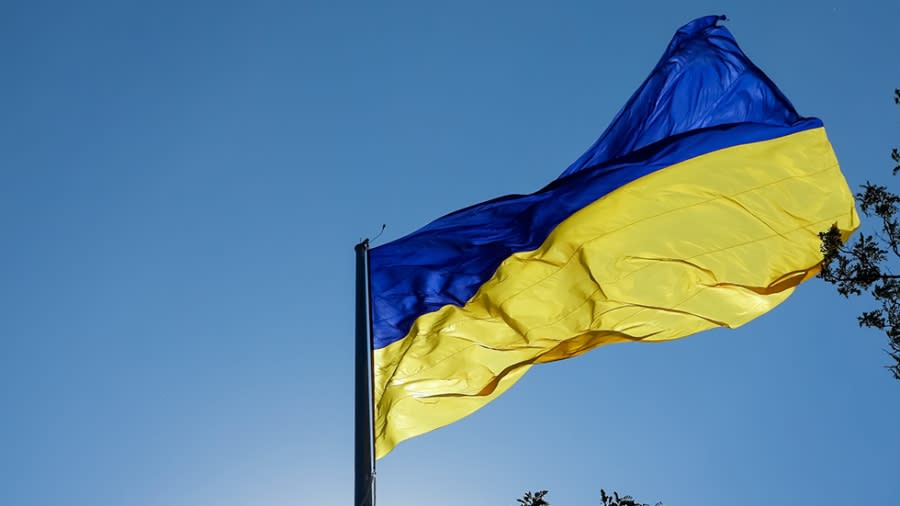Here are the 10 Republicans who voted ‘no’ on the Ukraine lend-lease bill

- Oops!Something went wrong.Please try again later.
- Oops!Something went wrong.Please try again later.
- Oops!Something went wrong.Please try again later.
Ten House Republicans voted against a bill on Thursday that seeks to create a lend-lease program that would make it easier for the U.S. to send military aid to Ukraine amid Russia’s invasion.
The legislation, titled the Ukraine Democracy Defense Lend-Lease Act, passed the House in a 417-10 vote. Three Republicans did not vote on the measure.
The bill now heads to President Biden’s desk after the Senate passed the bill by voice vote earlier this month. The legislation looks to give Biden increased authority to enter the U.S. into lend and lease agreements directly with Ukraine, which would allow Washington to provide Kyiv with defense articles to protect its population as Russia’s invasion continues.
The legislation streamlines the authority Biden already has under the Arms Export Control Act, which allows him to lend and lease defense equipment in situations when such a move is in the best interest for U.S. national security.
GOP Reps. Andy Biggs (Ariz.), Dan Bishop (N.C.), Warren Davidson (Ohio), Matt Gaetz (Fla.), Paul Gosar (Ariz.), Marjorie Taylor Greene (Ga.), Thomas Massie (Ky.), Ralph Norman (S.C.), Scott Perry (Pa.) and Tom Tiffany (Wis.) voted against the bill, and Reps. Rick Allen (Wis.), Troy Nehls (Texas) and Chris Stewart (Utah) did not vote on it at all.
The Hill reached out to the lawmakers for more information on their votes, or about why they did not cast a vote.
A spokesperson for Allen told The Hill that the congressman is isolating after testing positive for COVID-19.
Massie said on Twitter on Thursday that it was “insane” that Congress “authorized Biden to transfer virtually any weapon of war, other than a nuclear weapon, to Ukraine.” He included a screenshot of the statutory definition of “defense article” included in the bill.
In a statement to The Hill, Gosar suggested that he did not support the bill out of concern that it could bring the U.S. closer to war with Russia. He called for “peace talks” and a resolution to end the conflict.
“Every vote to provide military assistance to Ukraine draws us closer to a war with Russia. This is not our fight. I reiterate my hope for immediate peace talks and resolution of hostilities. Sending more weapons of war is counter to peace and will extend the death and destruction,” Gosar said.
Tiffany in a statement said the U.S. should only intervene in a conflict through blank-check military assistance when American national security interests are at stake.
“Intervening in an overseas military engagement – whether through the deployment of US personnel, or a blank-check for military assistance – is among the most serious decisions an American leader can make,” Tiffany said. “It is a step that should only be taken when clear, vital national security interests of the United States are at stake.”
A spokesperson for Gaetz told The Hill that the congressman “supports weapons for Ukraine” but “opposes waiving America’s future rights for repayment.”
Thursday was not the first time Massie and some of his GOP colleagues voted against a largely popular bill pertaining to Russia’s invasion of Ukraine.
On Wednesday, Massie and Greene were two of eight lawmakers to vote against the Asset Seizure for Ukraine Reconstruction Act, a nonbinding bill that urges Biden to confiscate assets from sanctioned Russian oligarchs and use the liquidated funds to support Ukraine. The Kentucky Republican said of his vote on that legislation that “giving Joe Biden unilateral authority to seize property in the United States without any due process sets a dangerous and disturbing precedent.”
And earlier this month, Massie, Greene, Biggs, Davidson, Gosar and Perry all opposed a bill that would direct Biden to write a report on the U.S.’s efforts to collect and examine evidence of war crimes and other atrocities that have allegedly been committed during the Russia-Ukraine conflict.
Some of the lawmakers were concerned by the involvement of the International Criminal Court (ICC). While the bill did not mention the ICC directly, it did note that evidence and information gathered could be utilized “in appropriate domestic, foreign, and international courts and tribunals prosecuting those responsible for such crimes.”
The passage of the lend-lease act in the House comes in the third month of Russia’s invasion of Ukraine. The U.S. has provided Ukraine with roughly $3.4 billion in security assistance since Russia began its invasion on Feb. 24.
— Updated at 10:30 p.m.
For the latest news, weather, sports, and streaming video, head to The Hill.

